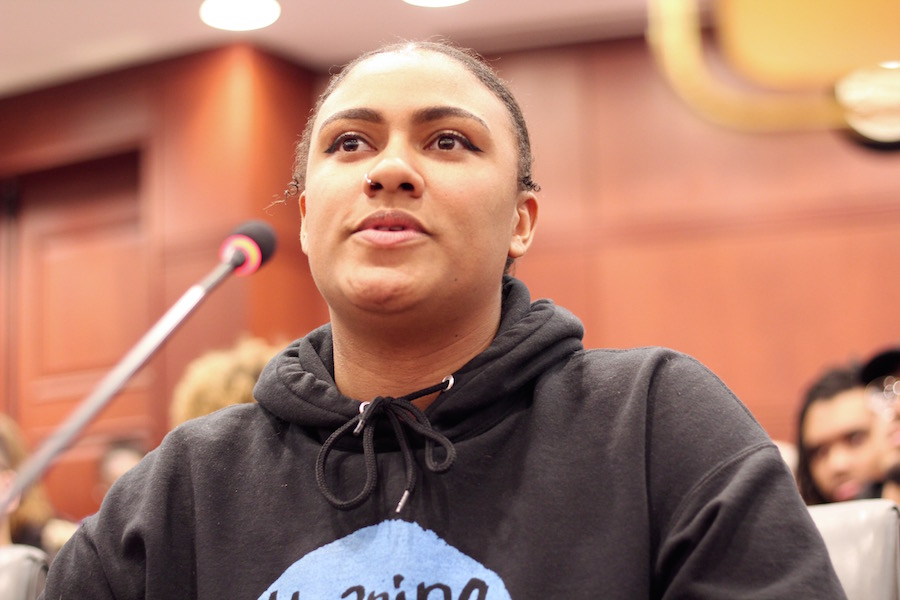

| Taylin Santiago, one of dozens of students to testify in favor of H.B. 7082 and 7083 Wednesday. The bills, which received overwhelming public support, will now go to committee. Lucy Gellman Photos. |
Hartford—Before Wednesday, Taylin Santiago had never heard of Luis Muñoz Marín. She could conjure Rosa Parks, but drew a blank if asked about Claudette Colvin. She told classmates about her Afro-Latino heritage, but didn’t have any history to fill in their questions.
Now, she wants to make sure that never happens to another student again.
A senior at New London High School, Santiago was one of almost 100 students and educators to testify Wednesday afternoon in support of raised H.B. 7082 and H.B. 7083, both proposed bills that would add African-American and Puerto Rican Studies requirements to public school curricula across Connecticut. Proposed by State Rep. Bobby Gibson, a Democrat who represents Bloomfield and Windsor, the bill follows last year’s passage of a law that requires the inclusion of Holocaust and genocide studies in public school curricula.
Howard Sovronsky, president and CEO of Jewish Federation of Greater Hartford and one of the fiercest advocates of last year's bill, kicked off the hearing with a passionate testimony, noting that “studying our shared history, learning about each other’s accomplishments and pains, only strengthens the bonds that connect us on this amazing journey we call America.”
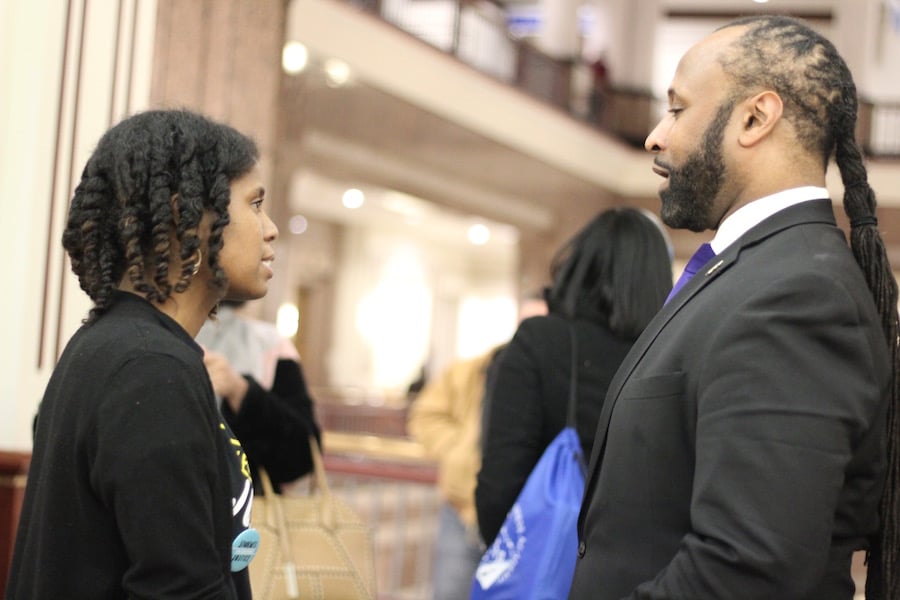
| Students for Educational Justice Founder and Director Hillary Bridges with State Rep. Bobby Gibson. |
After Wednesday’s hearing, during which the bills received overwhelming support, they will go to a private committee meeting where legislators decide whether to push them to the Connecticut House of Representatives.
Student turnout came largely from New London-based Hearing Youth Voices and New Haven-based Students for Educational Justice (SEJ), as well as a handful of Windsor-based students and educators who are in Gibson’s district. In partnership with Citywide Youth Coalition, CT Students for a Dream, Elm City-UROC and Hearing Youth Voices, SEJ has been actively working on a series of proposed amendments for the bills, which representatives of the organization presented in testimony Wednesday. Read them in their entirety here.
In particular, SEJ is pushing for a combined bill on the history of race and racism in the United States, with the inclusion of several amendments and a new title. The amendments advocate for required racial bias trainings, as well as the formation of a “Curriculum-Building and Oversight Committee” comprising teachers, students, and experts on race theory within the state’s existing Department of Education.
Those amendments are a welcome addition for students including Santiago, who spoke about her struggles as an Afro-Latina to learn about her own history in school. Somehow, she told legislators, she has made it through the final semester of high school with almost no knowledge of her African-American and Latinx ancestors and their role in both world and American history.

| Clockwise, from top left: Co-Op HS senior Brycen Thompson, Shane Brooks, Bloomfield Mayor Suzette Debeatham-Brown, who told a story of visiting a classroom and being asked if she was the person who "ended slavery," and Jonathan Gonzales-Cruz of CT Students for a Dream. "Learning about the creation of the concepts of race, whiteness and anti-blackness in our country would be beneficial not only to youth of color but to white students as well, in order for them to get a full picture of race relations in the United States," said Gonzales-Cruz. |
“Being both Black and Puerto-Rican, I know very little about either of my histories other than the fact that slavery and genocide were involved in both,” she said. “Many students I go to school with don't know what it’s like to go to bed hungry, many don’t understand the fear of police regarding the their safety, many don’t understand being watched in the store just because you got a little melanin.”
“We are trying to live and work around a system not built for us,” she added.
Committee members shifted in their seats as she spoke. Behind her—and despite the fact that State Sen. and committee chair Doug McCrory had cautioned them not to—a packed hearing room let out murmurs and mmms of approval. State Rep. Robert Sanchez, a Democrat who represents New Britain, raised his hand.
“During this whole time, give me some examples of what you have learned about African-American history or Hispanic history in school,” he said.
“I have no names,” Santiago said.
“None?” he asked.
“From slavery to the civil rights movement is about what I know, and even then I feel like I can’t tell you much more than Martin Luther King was involved,” she said. “It’s a very basic knowledge of that.”
Sanchez brought out a string of names including Luis Muñoz Marín, the first elected governor of Puerto Rico. Santiago shook her head just slightly.
“No,” she said.
“It’s Like Whiplash”
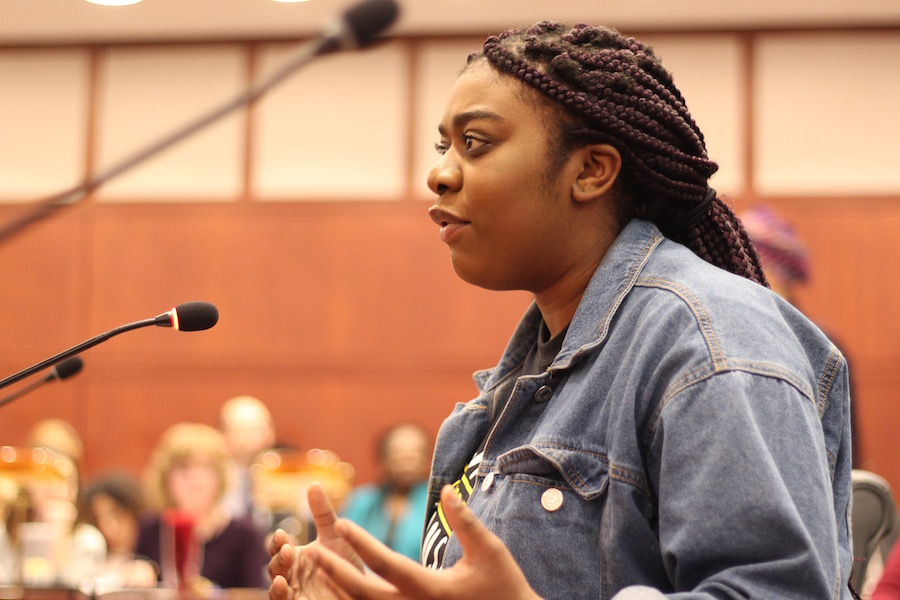
Benie N'sumbu: “It was like the more American I became, the less African I became, and I felt I couldn’t be both."
Benie N'sumbu, a senior studying creative writing at Cooperative High School in the Arts & Humanities (Co-Op) in New Haven, told legislators Wednesday that she was excited to support the bill as a measure “that directly hits at the core of the racial disparities in America.”
At the age of five, N'sumbu immigrated with her family to New Haven from the Democratic Republic of Congo. Through elementary and middle school, Black and Latinx classmates told her “that I acted white,” a label she realized came from her quiet presence in classes, good grades and neat-edged English when she did speak up. The longer she was in school, the more she struggled with holding on to her Congolese heritage.
“It was like the more American I became, the less African I became, and I felt I couldn’t be both,” she said. Of her classmates’ taunts, she added that “this resulted in years of internalized racism that I am still working toward dismantling toward this day.”
Then her sophomore year, N'sumbu met SEJ Founder and Director Hillary Bridges in a writing class at school, on a day that Bridges had been invited to come and speak about her work in New Haven. Bridges used words that N'sumbu had never heard: internalized racism and anti-blackness. In N'sumbu’s head, something clicked immediately.
“I didn’t have the words for it,” she said before the hearing, recounting Bridges’ visit to the class. “It’s like whiplash—you’re going to go through your entire life thinking this thing.”
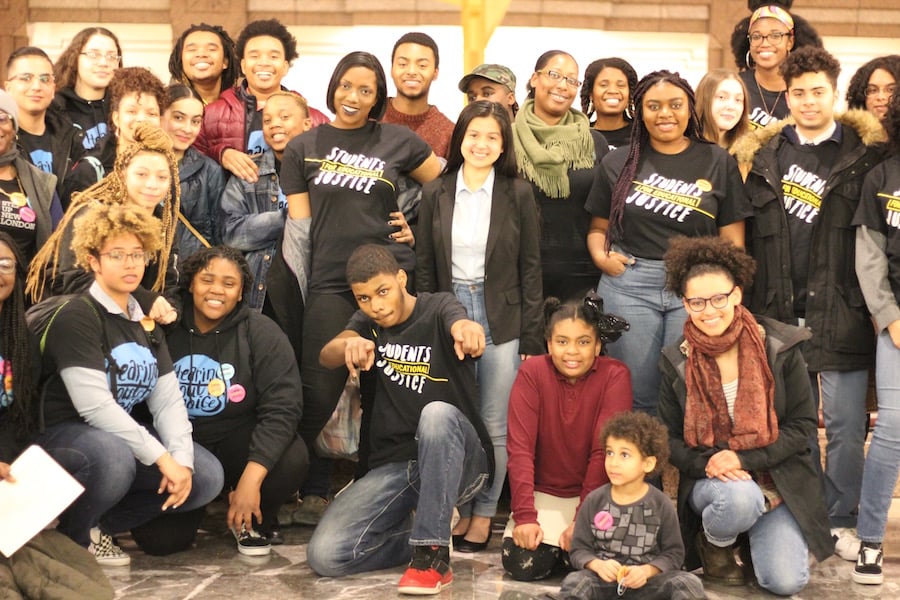
N'sumbu said she considers herself lucky to be at Co-Op, where her literature, language and history courses offer her reading and writing options that she doesn’t see her peers getting in other schools. In her history courses, N'sumbu was rocked by reading Ida B. Wells’ letters against lynching and learning about slave rebellions on both Haitian and American soil.
Then last year, her AP English Language teacher pushed her to write on Matthew Jacobson’s Whiteness of a Different Color, which outlines race as a social construct. The essay that came out of it, a critical look at immigration and racism in her own life, became the basis of her testimony Wednesday. This year, she’s been taking a deep dive into Ralph Ellison’s Invisible Man. She praised faculty at Co-Op, which is still overwhelmingly white, as digging beneath the surface of widely accepted history curricula.
But, she added before the hearing, “you shouldn’t have to wait until you’re in high school, or in an AP class” to get basic exposure to those texts.
“Did you have exposure to any African-American history up until … AP was what, your junior or senior year?” asked State Rep. Patricia Billie Miller, a Democrat who serves Stamford.
“Just the basics,” answered N’Sumbu. “We talked about slavery, civil rights in middle school, and then learning about Martin Luther King and all of that. But we never really dug deep into the history of race and racism in the United States. In talking about what was going on, you know, before the Civil War.”
“Right,” Miller responded. “So did you learn anything about the Black codes, Jim Crow laws, Brown v. Board of Education?”
“My history of African-American history started from slavery up until the civil rights movement,” she answered.
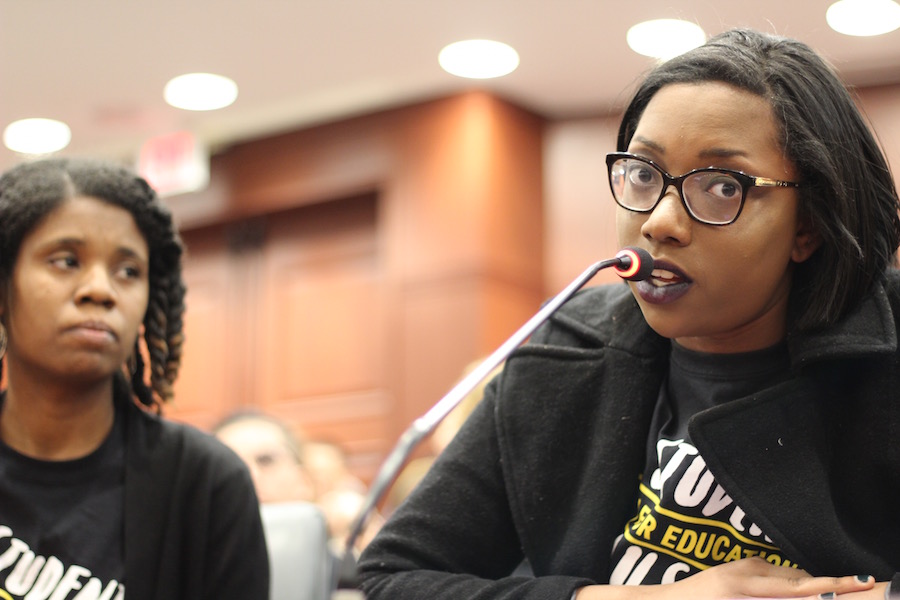
| Mia Joseph. Hillary Bridges is in the background. |
So too for Mia Joseph, who attends Metropolitan Business Academy (MBA). Taking a deep breath before launching into her testimony, Joseph recalled that she didn’t think racism was still a thing—until it suddenly was looking her squarely in the face. Born and raised in Ansonia—"not a diverse city, by any means,” she said—Joseph described her youth as spent in a largely white bubble, one of the only students of color in her school, neighborhood and friend group.
“I grew up with a belief that we lived in a post-racial society,” she said. “The idea that racism did not exist left an impression on me.”
For years Joseph said, she allowed herself to believe that racism was something restricted to the past, where a line connected slavery and the Jim Crow era, then stopped neatly at the civil rights movement. In her mind, only one action could signify racism: someone calling a person of color “the n-word, and nothing else.”
“I believed racism could only happen to Black people and not anybody else,” she continued.
Nobody ever called her that word. And for years, she shrugged off the idea that there could be racism in the twenty-first century. Then a few years ago, she started to think about her own history, and how it had been suppressed, erased or glossed over in her classrooms, friendships, and everyday interactions.
“I internalized racism by growing up believing that I was somehow inferior, and that there was something weird about me, because I was not like my white counterparts,” she said. “This did not help with the school system that I went through, because the history [wasn’t taught].”
“With SEJ’s amendments, we will finally be able to start dismantling systemic oppression by teaching people the history of race and racism, and how it very much determines how we live as people, and why certain people have privileges that other people do not.”
“I Personally Am Sick And Tired”
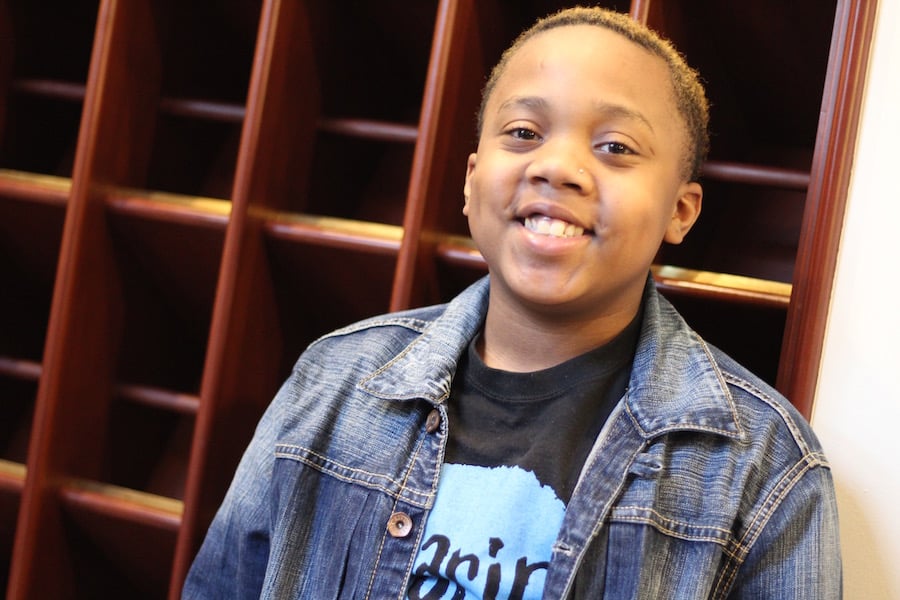
| Dominick Burrel: "I personally am sick and tired of being in a elevator with white folks feeling the discomfort I feel when they clench their bag tighter to them, or when I’ve been accused me for being 'racist' for speaking up on my opinions, when now is the day to speak up." |
Other students appealed to legislators with stories of sheer exhaustion. Dominick Burrel, a freshman who travels from New London to Willimantic for school at Arts at the Capitol Theatre Magnet School each day, told the room that he is tired of making himself small and unassuming in white spaces, like elevators where fellow passengers hold their bags tighter, or classrooms where he’ expected to show up, and listen to white educators gloss over his ancestral history.
He said he believes that if the bill passes into law, it will alleviate some of the erasure he feels both in and outside of the classroom. Responding to a question from Miller, he added that he has only had one Black teacher in his life, in the third grade. Now, he’d like to see more of it in the classroom.
“I want to be able to learn about people that look like me, especially in the arts field,” he said. “Talk about the things we have done, and we give credit to those who deserve it.”
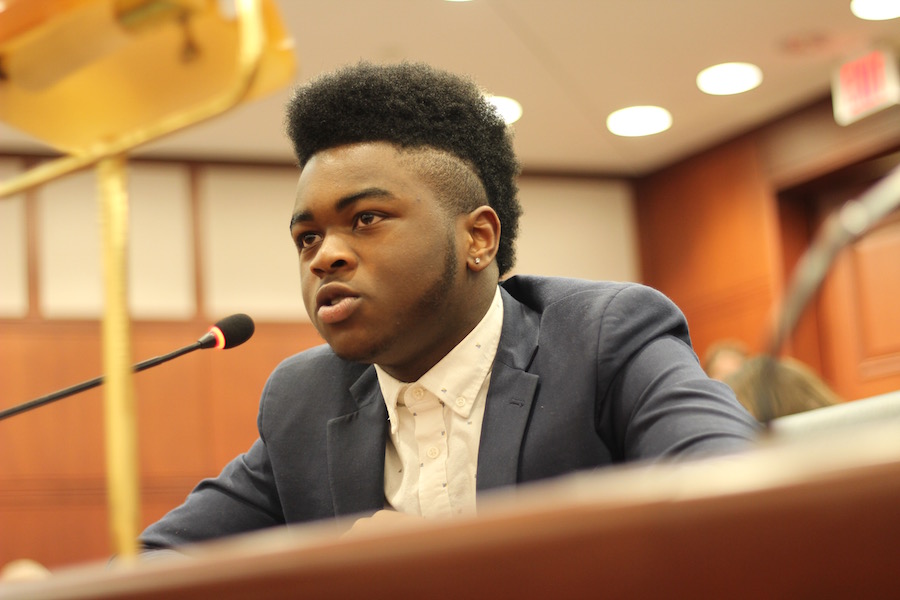
| Windsor high school student Dahmarre Bournes. |
Echoes of his testimony rose again and again as students from around the state took took their turn before the committee. Dahmarre Bournes, a freshman at Windsor High School, recalled the pain and frustration he felt during middle school, when an affinity group for young men of color received complaints from several white students and teachers, and was ultimately shut down by the school.
New Haven Academy student Sebastian Ward lambasted an education system in which he learned more about his background at home than he did at school. He recalled that it was his mother, and not his teachers, who encouraged him to dive into biographies of Thurgood Marshall, W.E.B DuBois, Malcolm X, Frederick Douglass, Langston Hughes and other Black writers, thinkers, and makers.
By fifth grade, Ward said he had started to notice the disparity while talking about movers and shakers in American history. That year, during which he recalled no Black History Month curriculum, the only person of color the class learned about was Crispus Attucks, still taught as the first person to be killed in the Revolutionary War.
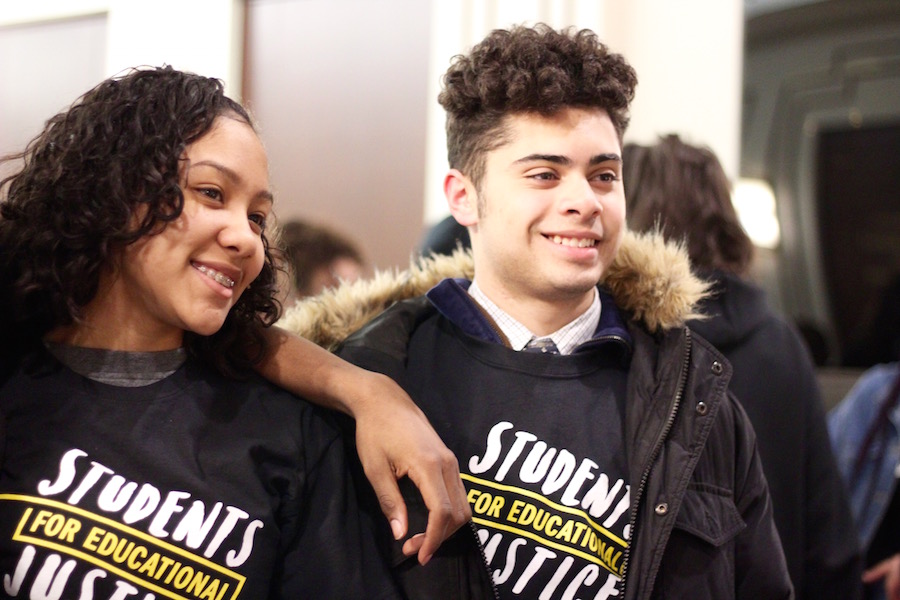
| Students Alona Santiago, who did not testify but said she supports the bills with SEJ's amendments, and Sebastian Ward. |
“Isn’t it crazy to think that Black men were getting shot by cops in America before America was even a country?” he said to a chorus of oooohs from those who had gathered in the hearing.
In seventh grade, Ward said he recognized a problem when the class learned about Harriet Tubman, and one of his classmates asked if she had been the woman arrested for sitting in the front of a bus. It got under his skin—especially because that same classmate was a self-proclaimed expert in the Vietnam War.
“People simply do not know Black History, despite it being intrinsically attached to the history of everyone else,” he said. “The net benefit of this passing will be immeasurable. Black students all over the state will feel far more represented in their school, ultimately leading to their achievement.”
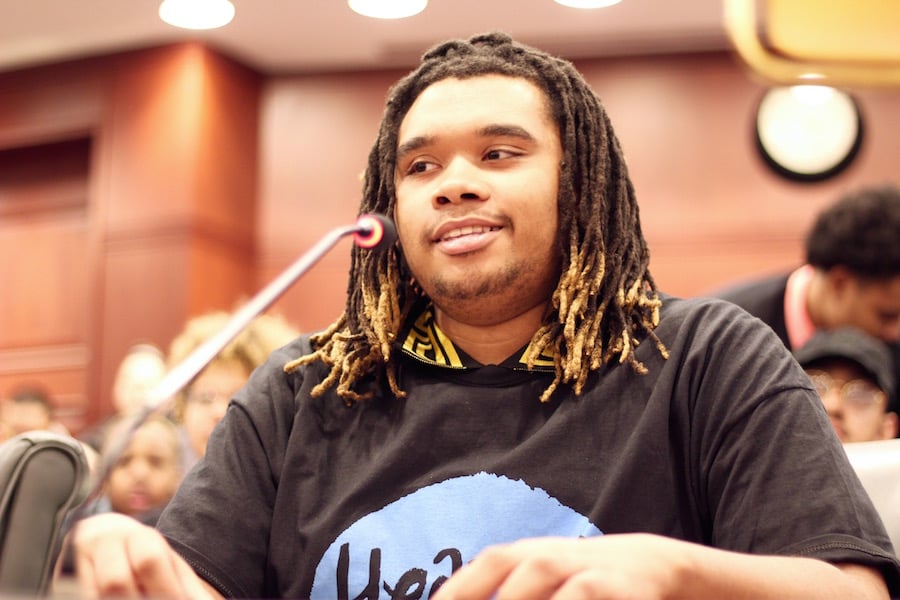
| Shawn Brooks: "I support the enactment of this bill because as an African American male I tend to feel isolated in the classroom due to the fact that the other U.S history curriculums focus on white exceptionalism and black inferiority. In no other way, shape, or form do I want students to internally and psychologically feel inferior due to them not knowing their history and the achievements that come with it." |
Or twin brothers Shawn and Shane Brooks, both seniors at Science and Technology Magnet High School of Southeastern Connecticut in New London. Before the hearing, both recalled that although Black and Latinx students make up a majority of their school, the majority of teachers, administrators, and support staff are white, with no training in anti-racism or anti-bias work.
While their school offers a half-year elective course in ethnic studies, they both believe that a mandatory requirement will combat colorism and anti-blackness that they see from both fellow students and faculty.
On a bright February day last year, Shawn Brooks recalled, his history class had been running on a 20-minute snow delay. In the time before the rest of the class arrived, he had suggested that students who were already present dive into a micro-unit on African-American history. He pointed out that it was, after all, Black History Month.
“We don’t have time for Black history,” the teacher allegedly replied.
It wasn’t the first time they said they’d felt erased in their own school. Earlier that same year, Shawn said that same teacher had reprimanded him for his clothing choices. He recalled walking into the classroom and hearing “take off your hoodie, you’re scaring me.”
“You Are Making History”
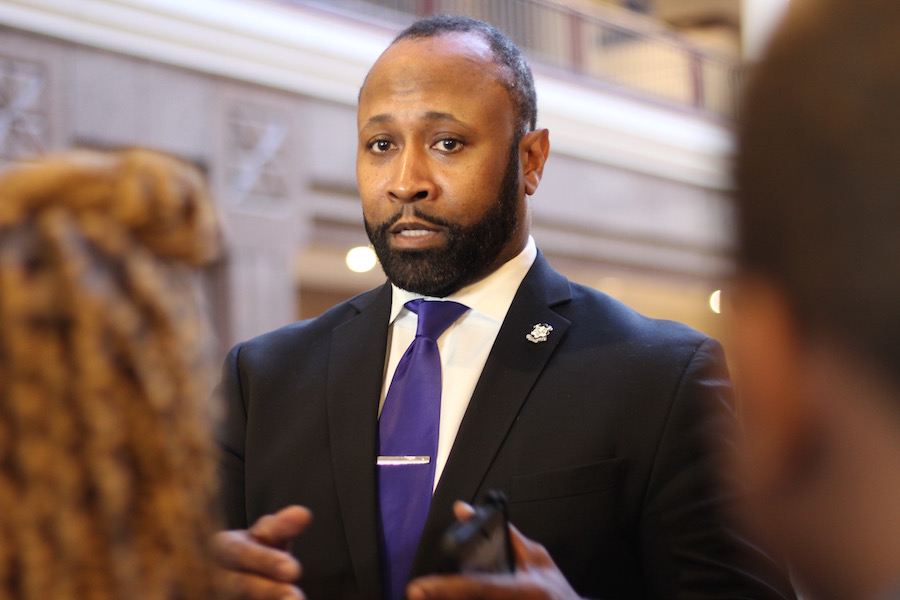
| State Rep. Bobby Gibson: Your testimony will be part of the state's history. |
Throughout the hearing, Gibson often paused to thank students for coming. While they testified, he and other committee members leaned in, listening closely and following up with questions on their classes and curricula. How many teachers of color had they had? When had they first learned about Jim Crow? Did their teachers cover the African diaspora? What about U.S. colonialism, and the fact that Puerto Ricans are indeed Americans?
As students finished their testimony and headed back to New Haven and New London, Gibson gathered them out in the hallway outside the hearing room, explaining the process that the bill must go through before it becomes a law. He praised them for their words, noting that he sensed the hearing would become a piece of Connecticut history.
“You are making history,” he told them, pausing for photos and selfies before heading back inside. In an interview following student testimony, he described himself as cautiously hopeful, noting that the legislation is long overdue in the state’s schools.
As as former coach, he added, “I’m always thinking about the follow-through.”

